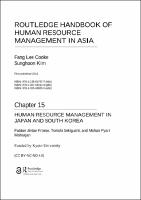Chapter 15 Human Resource Management in Japan and South Korea
Proposal review
Author(s)
Froese, Fabian Jintae
Sekiguchi, Tomoki
Maharjan, Mohan Pyari
Language
EnglishAbstract
This chapter examines HRM in Japan and Korea. The two neighboring nations situated in Northeast Asia have a mixed feeling towards each other for historical reasons, despite traditionally sharing much in their HRM systems. Since the early 1980s, Japan and Korea have been two high performing economies in Asia that have developed many successful MNCs. In this chapter, the authors provide a comparative overview of the unique HR systems of large enterprises of these two countries. While the respective Japanese and Korean HR system resembled each other in the past, economic recessions and globalization have led Korean enterprises to modify their HR systems more aggressively, mostly in line with Anglo-Saxon practices, in contrast to Japanese enterprises which have been more reluctant to implement changes. The authors argue that in today’s increasingly globalized and knowledge-intensive environment, global integration of HRM has become one of the key HR challenges for Japanese and Korean MNCs. For instance, Japanese and Korean MNCs need to overcome the tradition of homogeneous and ethnocentric organizational culture that undermines the integration of foreign nationals into the core functions of the company. The authors suggest that more research should examine the ‘internal internationalization’ at headquarters and ‘external internationalization’ at subsidiaries of Japanese and Korean MNCs.
Keywords
Asia; Cooke; handbook; HRM; human; management; resourceISBN
9780367581138, 9781315689005Publisher
Taylor & FrancisPublisher website
https://taylorandfrancis.com/Publication date and place
2018Grantor
Imprint
RoutledgeClassification
Personnel and human resources management
Ethnic studies
Regional / International studies


 Download
Download